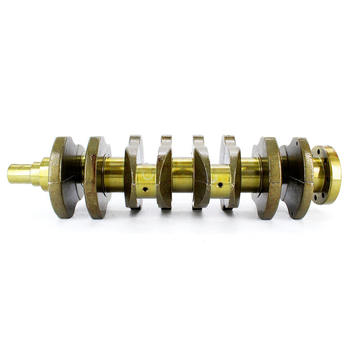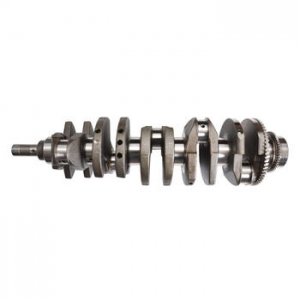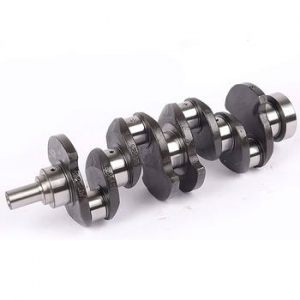In the demanding world of heavy machinery and industrial applications, components are not just parts; they are the very heartbeats of operations. Few components are as critical, as central to the function of engines, compressors, pumps, and other vital equipment, as the crankshaft. This intricate piece converts linear motion into rotational motion, enduring immense stress, torque, and fatigue loads day in and day out. Its failure can mean catastrophic downtime, costly repairs, and significant production losses. This underscores why selecting the right industrial crankshaft supplier is not merely a procurement decision, but a strategic partnership choice. It's about ensuring the longevity, reliability, and performance of your most valuable assets. To be honest, finding a supplier who understands the nuances of your specific industry needs, whether it's for marine engines, power generation, oil and gas equipment, or mining machinery, requires careful consideration beyond just the price tag. You need a partner capable of delivering not just a component, but a guarantee of quality and dependability. Have you ever considered the true cost of a component failure versus the investment in a high-quality part from a trusted source? The difference can be staggering, highlighting the unparalleled importance of starting with a foundation of excellence in your supply chain for these critical parts.
The challenges in sourcing high-quality industrial crankshafts are manifold. Unlike standard off-the-shelf parts, industrial crankshafts often require specific materials, complex geometries, and stringent dimensional tolerances dictated by the unique requirements of the equipment they serve. Add to this the harsh operating environments – extreme temperatures, corrosive atmospheres, heavy loads – and it becomes clear that these are not components where compromises can be made. A reliable industrial crankshaft supplier must possess deep technical expertise, state-of-the-art manufacturing capabilities, and a relentless commitment to quality control. They need to understand material science, forging processes, heat treatment methodologies, and precision machining down to the micron level. Without this foundational knowledge and capability, the risk of receiving substandard parts that could fail prematurely increases significantly. Frankly speaking, relying on suppliers who cut corners on materials or manufacturing processes is a gamble you simply cannot afford to take in industrial settings. It's worth noting that the complexities extend beyond manufacturing to areas like logistics, packaging, and documentation, especially when dealing with international supply chains or highly regulated industries. Ensuring traceability and compliance with industry standards are also non-negotiable requirements that separate true professionals from less experienced vendors.
So, what should you look for when evaluating potential partners in this critical area? The reputation and track record of an industrial crankshaft supplier are paramount. Look for suppliers with a proven history of serving industries similar to yours and positive feedback from existing clients. Their experience in handling diverse requirements, from small custom runs to larger production volumes, speaks volumes about their adaptability and capability. Dive deep into their manufacturing facilities and processes. Are they leveraging advanced technologies like CNC machining, robotic welding (if applicable), and automated inspection systems? What are their material sourcing practices? Do they have strong relationships with reputable steel mills to ensure consistent material quality? A supplier who is transparent about their processes and quality controls inspires confidence. Many experts agree that a willingness to allow facility audits or provide detailed process documentation is a strong indicator of a supplier's integrity and commitment to excellence. Furthermore, consider their capacity for innovation and problem-solving. Can they offer design assistance or suggest material alternatives to optimize performance and cost? A supplier who is proactive in helping you improve your components is a true asset.
Manufacturing precision is non-negotiable when it comes to industrial crankshafts. The process typically begins with selecting the right material, often high-strength alloy steel forged under immense pressure to refine the grain structure and enhance mechanical properties. The forging process itself is critical, shaping the raw material into the basic form of the crankshaft. Following forging, various heat treatment processes like normalizing, quenching, and tempering are applied to achieve the desired hardness, strength, and toughness characteristics. This is where expertise truly matters, as improper heat treatment can lead to internal stresses or undesirable material properties that compromise the crankshaft's integrity under load. Precision machining then brings the forged and heat-treated blank to its final dimensions. This involves complex operations on journals, pins, counterweights, and flanges, requiring highly accurate CNC machines capable of holding extremely tight tolerances. Grinding and polishing follow to achieve the specified surface finish on critical bearing surfaces, minimizing wear and friction during operation. It's a multi-stage process, and excellence at each step is essential. Suppliers specializing in custom industrial crankshaft manufacturing often have specialized equipment and highly skilled technicians trained specifically for these complex operations.
Quality assurance and rigorous testing standards are the bedrock of a reliable industrial crankshaft supplier. A comprehensive quality control system should be in place from raw material inspection through every stage of manufacturing to the final product. This includes dimensional checks using precision instruments, material analysis (chemical composition, mechanical properties), and non-destructive testing (NDT) methods like magnetic particle testing (MPT) or ultrasonic testing (UT) to detect any internal or surface flaws. Dynamic balancing is another critical step, especially for high-speed applications, to ensure the crankshaft rotates smoothly without excessive vibration, which can lead to premature bearing wear and equipment damage. Suppliers should be able to provide detailed inspection reports and material certifications for every batch or even every single critical component if required. Frankly speaking, if a supplier is hesitant to share their QC procedures or test results, it should raise a red flag. Reliability in industrial applications hinges entirely on the consistency and verifiable quality of components. Therefore, the supplier's investment in advanced testing equipment and a dedicated quality control team is a direct reflection of their commitment to delivering parts that will perform reliably in demanding operational environments. Partnering with a supplier who prioritizes these aspects is an investment in the uptime and longevity of your equipment.
Beyond standard manufacturing, the ability of a supplier to handle specific application needs and offer custom industrial crankshaft manufacturing is a significant differentiator. Many industrial machines, especially older models or highly specialized equipment, require crankshafts that are not available off-the-shelf. This might involve reverse-engineering a damaged part, adapting an existing design for a new application, or manufacturing a completely new design based on unique specifications. A supplier with strong engineering and design capabilities can be invaluable in these situations. They can work with you to optimize the design for manufacturability, performance, and cost, leveraging simulation tools and their deep understanding of crankshaft mechanics. This customization capability is particularly important for industries where downtime for equipment requiring unique parts is exceptionally costly, such as maritime, power generation, or large-scale mining. It's not just about producing a part; it's about producing the *right* part that fits perfectly, performs flawlessly, and stands up to the specific stresses of its intended use case. Suppliers offering this level of customization are not just vendors, but technical partners invested in your operational success. The ability to reliably produce custom parts often relies on flexible manufacturing processes and highly experienced machinists capable of complex setups and precise execution, further highlighting the importance of a supplier's technical depth.
For demanding applications like powering large ships or generating electricity, the need for incredibly durable and reliable components is paramount. Supplying heavy-duty engine crankshafts requires a specific kind of expertise rooted in experience with large-scale forging, specialized heat treatments for deep hardening, and precision machining of substantial components. These crankshafts are subjected to enormous forces and pressures within massive engines, and any imperfection can lead to catastrophic failure. Suppliers specializing in this niche understand the critical importance of material purity, grain flow during forging, and achieving precise tolerances and surface finishes on journals that can be meters long. They often work with specialized equipment capable of handling components weighing several tons. Ensuring the metallurgical integrity and mechanical properties are consistent throughout such large parts is a significant technical challenge that only experienced suppliers can reliably meet. The supplier's history in providing components for specific engine types or manufacturers can be a strong indicator of their capability in this area. This level of specialization means they are familiar with the specific requirements and performance expectations of heavy-duty applications, offering an added layer of confidence in the parts they supply.
Choosing an industrial crankshaft supplier is also about building a long-term partnership. It's not just a transaction; it's a relationship based on trust, reliability, and mutual understanding of operational needs. Consider the supplier's technical support and after-sales service. Are they accessible for questions during installation or operation? Can they provide guidance on maintenance or troubleshooting? What is their process for handling potential issues or warranty claims? A supplier who stands behind their product and offers responsive support can significantly reduce headaches and minimize downtime in the long run. Furthermore, evaluate their supply chain management and logistics capabilities. Can they deliver parts reliably to your location, whether it's across the country or internationally? Do they have secure packaging methods to protect these valuable components during transit? A supplier with efficient logistics and robust inventory management (if applicable) can ensure you receive the parts you need when you need them, preventing costly delays. The ease of communication and responsiveness of their team also contribute significantly to the overall partnership experience. A supplier who is easy to work with, communicates proactively, and addresses concerns promptly makes the entire sourcing process much smoother and more reliable, freeing you up to focus on your core business operations.
In our experience, the most successful industrial operations are those built on a foundation of reliable components sourced from trusted partners. We understand the immense pressures and demands placed upon industrial crankshafts and the machinery they power. That's why our focus is on delivering not just parts, but solutions that contribute directly to the performance and longevity of your equipment. We leverage advanced forging techniques, state-of-the-art heat treatment processes, and precision machining to manufacture crankshafts that meet the most stringent quality standards. Our experienced engineering team can assist with design optimization and provide custom industrial crankshaft manufacturing services tailored to your unique specifications and application needs. We are committed to rigorous quality control, employing comprehensive testing methods to ensure every crankshaft leaving our facility meets our high standards and yours. Our goal is to be more than just a supplier; we aim to be a trusted extension of your team, providing the reliable, high-performance components necessary to keep your operations running smoothly and efficiently. Partnering with us means gaining access to a wealth of technical expertise and a commitment to excellence that translates directly into the reliability of your machinery.
So, where does this leave you in your search for the ideal supplier? Armed with the knowledge of what truly matters – expertise, quality, customization capabilities, and a commitment to partnership – you are better equipped to make an informed decision. Don't settle for the lowest bidder without thoroughly vetting their capabilities and track record. Ask tough questions about their processes, their quality control, and their experience with applications similar to yours. Request references and speak to their existing customers. A reliable industrial crankshaft supplier will welcome this scrutiny, as their quality and professionalism will speak for themselves. Remember, the performance and longevity of your critical industrial machinery depend heavily on the quality of its most vital components. Investing in high-quality crankshafts from a trusted supplier is an investment in your operational uptime, efficiency, and ultimately, your bottom line. Make this crucial decision with the diligence it deserves, and choose a partner who can consistently deliver the excellence your operations demand. The right choice can make a significant difference in your long-term operational success.
For more detailed information, please visit our official website: industrial crankshaft supplier




